
Family Health Options Kenya (FHOK)
Family Health Options Kenya (FHOK) is one of the leading providers of reproductive health services in the country. For over 50 years, they have provided their clients with comprehensive care. FHOK refused to sign Trump’s Global Gag Rule because they will not deny their clients access to the full range of medically accurate information. Subsequently, they lost their U.S. funding, forcing them to shutter the doors of clinics serving Kenya’s most vulnerable communities.
Patient Stories
Stores below collected by Lisa Shannon, Cofounder and CEO of Every Woman Treaty
Mary K.
“I had many dreams, to be a lawyer in the future, to bring justice for people in Kibera who don’t have an education.”
Mary was a senior in high school when she became pregnant. Overwhelmed by the prospect of becoming a mother, Mary contemplated an abortion.
“How will I start, where will I start? I have no money, I’m in school. But I was scared of having an abortion. I have a friend who had an abortion, and survived. But this friend warned me that its very risky. Also, the amount they asked have an abortion was 5000 shillings (50 USD). That was too much for me.”
Mary married her boyfriend, and they live together, raising their daughter. Her husband is a handyman, Mary now sells second-hand clothing. Together, they make about 80 dollars per month. Mary goes to FHOK for family planning and health care for her child.
“Without family planning, people will get so many children. I only want to have two children. Another? Maybe in four years. That’s my dream.” She hangs on to her high school dream, as well. “I dream to be a lawyer. Or a journalist.”
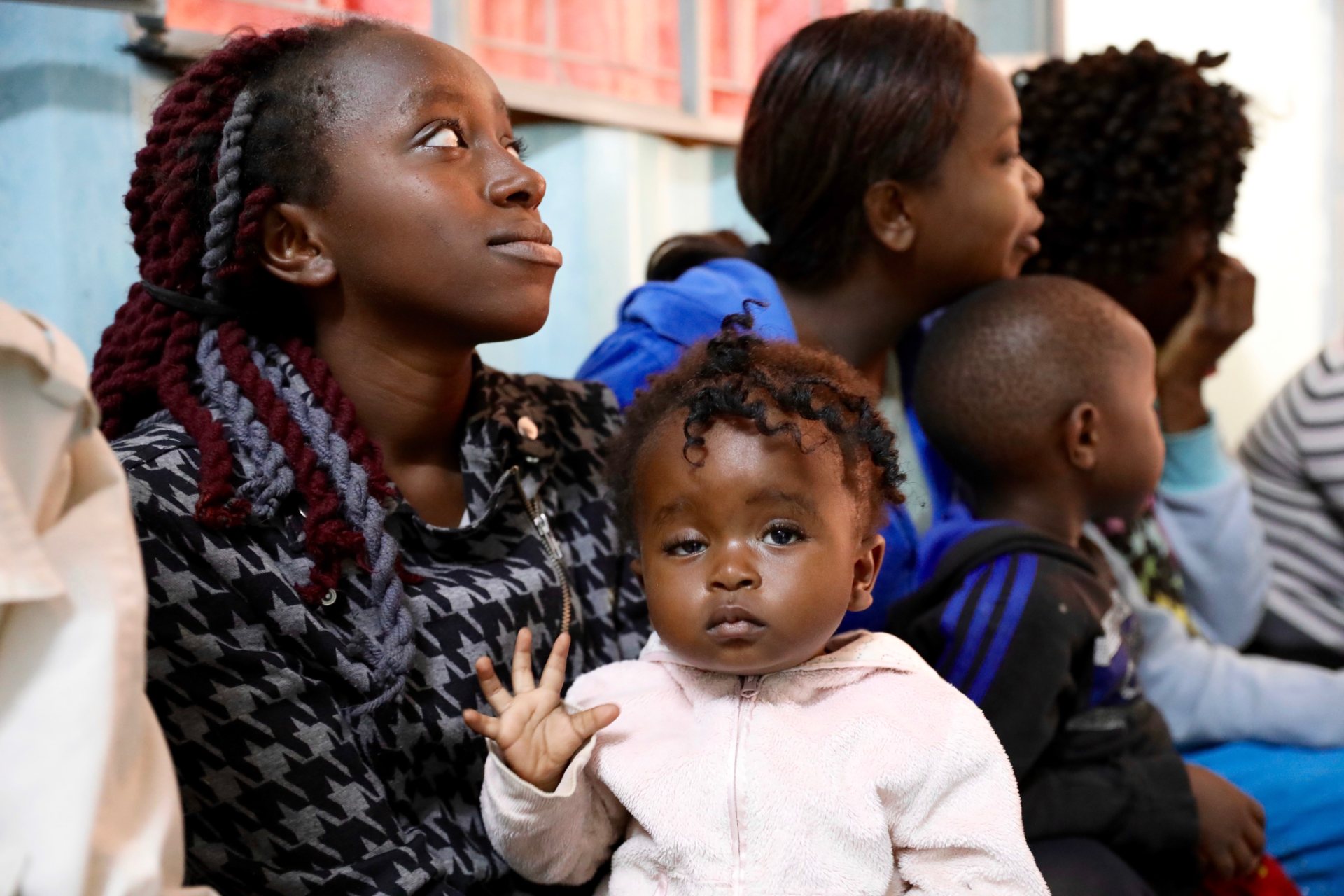
Mary M.
Mary M. waits with her child at the FHOK clinic in Kibera. “Okay, you know, they are charging us. Even when Obama was there, we were getting medicines just free. But for now they are charging. Maybe, okay, for that week I have not worked. My kid is sick. I have to come for medication, but I don’t have any money. My kid is sick. She might even die. In a hospital like this one, we come, and we are given medicines free. If you come here and you can be charged something like 800, you don’t have even 50 shillings, then they tell you to go. You just have to go back to your house with a sick child. Cause just Trump has refused to assist us. What can we do?
Or is he happy when people are dying? Is he happy? Trump should think. All of us, we are created by God. Just tell him to have the heart.”
“Educating them, sometimes they are sick, I don’t have money to take them to the hospital, the elder one is in form two, so just to have the fee is a problem. So, I sacrifice myself. I go for work. Sometimes I go to places we call cojengo. I hustle there.” “But now it’s difficult, since Trump won’t give us the aid, we go somewhere [to get birth control], and they tell us we don’t have, we don’t have, we don’t have. You see?”

Faith*
Faith*, a patient at FHOK’s Kitengela Clinic, recently learned she is HIV positive. “I slept with men. We were using protection. But the condom broke.” Faith gets her anti-retroviral drugs at the FHOK center, and has managed to control her viral load. When asked what she will do if they close this clinic because of the Global Gag Rule, Faith responds, “If this clinic closes, I will have a problem…I will feel ashamed to go to another clinic, to start anew with my condition.”
*Faith is a pseudonym to protect the person’s identity.

Mercy
“[I seek family planning services so] that my daughter can have the best. Not like me. And when she grows up, I will introduce her to family planning.”
“[The clinic closing would be] a very bad situation for girls and women like us.School drop-out has been controlled through family planning. Mothers are controlling their births because of family planning. And if that will go away, it will be a big problem. The [birth rate] will increase. Children will grow in a very bad situation.”
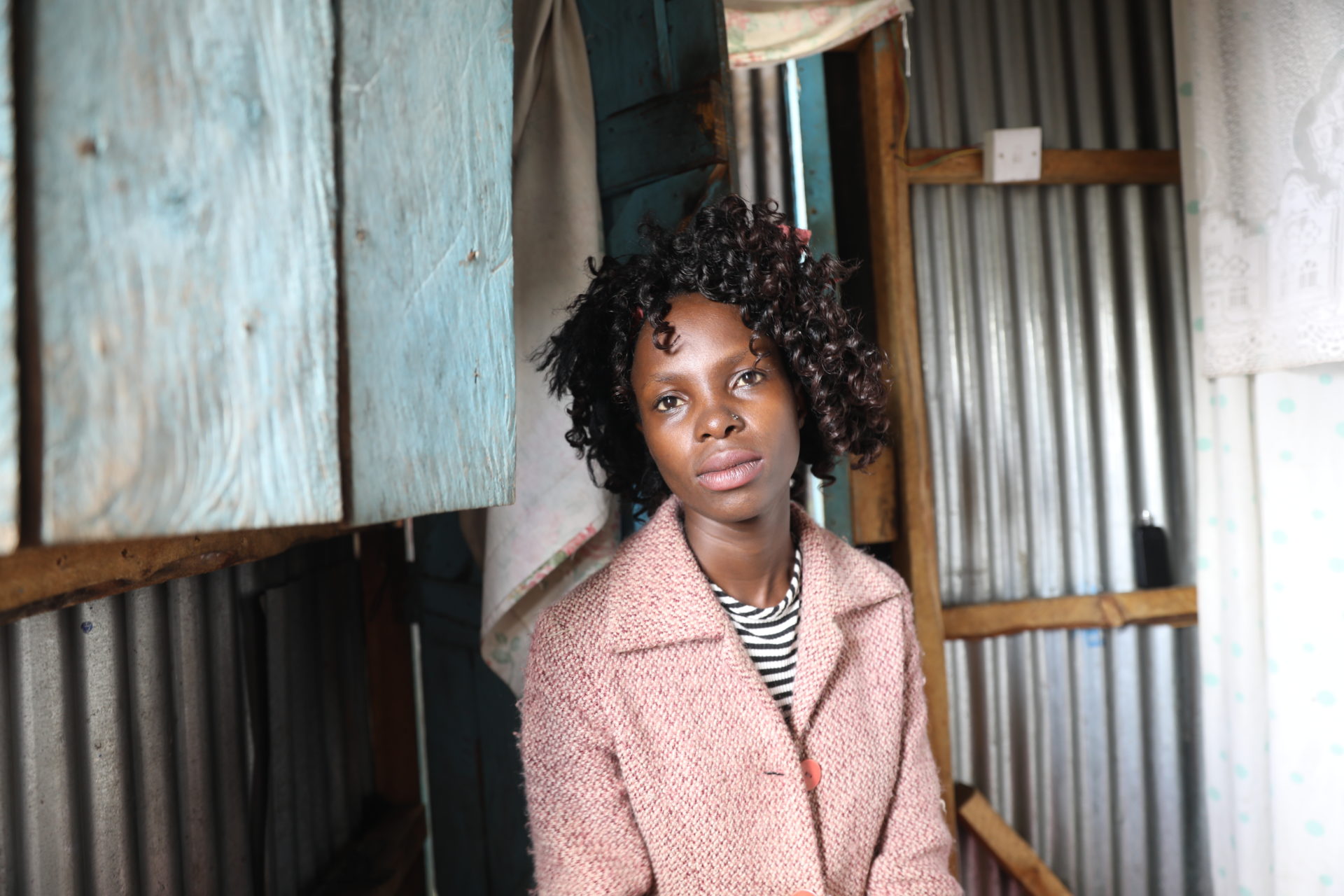
Aisha*
Aisha grew up in Nairobi’s notorious Kibera slum. When she was 16, money for food and school fees ran out. “There was some guy who…liked me.” He was older—32, married with several children—and willing to pay 150 Kenya Shillings (a dollar and fifty cents) for sex. She used the money to return to school, and pay for food. “It became a routine.”
After becoming pregnant for the second time at 18 years old, Aisha went to a “curtain clinic” for an abortion. For thirty dollars, they gave her a pill and suppository, which she administered at home. “I was very scared.” As the bleeding continued and pain increased, she went to the hospital. Aisha claimed she was having a miscarriage, but upon examination, the medical staff found the suppository inside of her, not fully dissolved.
”They kicked me out, told me to just go.”
At home, she went from bad to worse, in extreme pain and much blood loss. The partial abortion had gone septic— a life-threatening complication. Her aunt took her to another hospital. The fetus had gotten stuck on expulsion from her womb. A doctor there was able to complete the procedure. At home, it took a full month to recover. It was then she learned about FHOK through a cousin who attend the clinic. She began to use birth control, so she would never again be in that situation.
*Aisha is a pseudonym to protect the person’s identity.
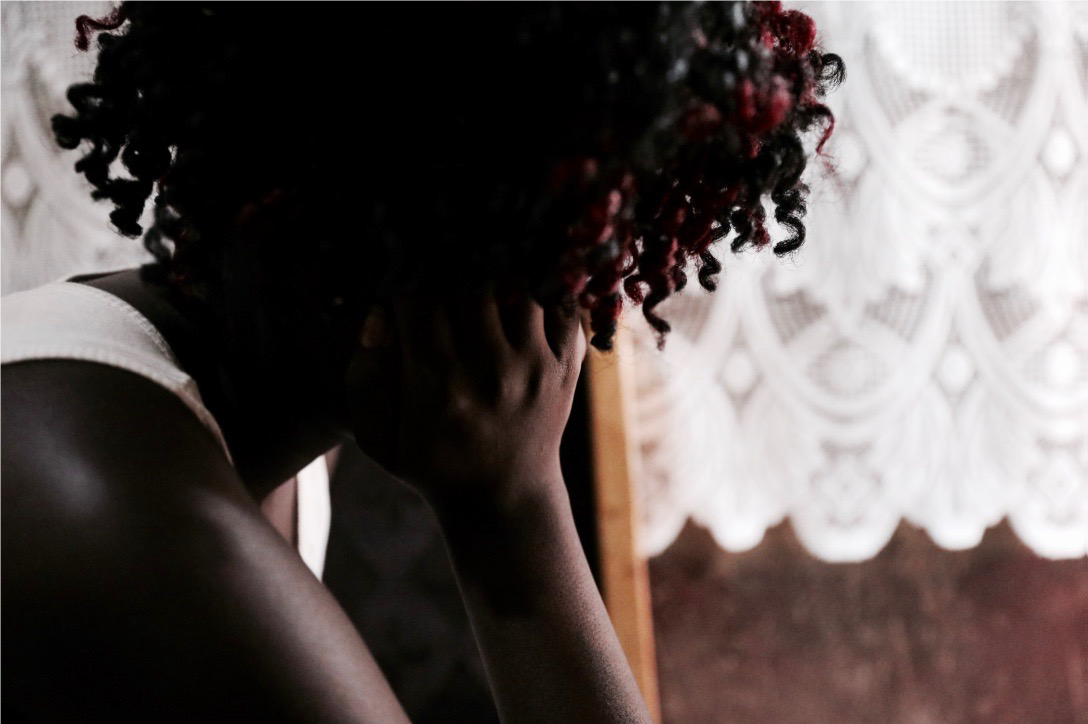
Everlyne
Just a few doors down from FHOK’s Kibera clinic, Everlyne, a thirty-five year old mother of three, combs out her daughter’s braids her beauty salon. On a good week, she makes about twenty dollars. “Sometimes the kids go without food. Because it’s not every day you can get this work. Sometimes you go without it, and they can even sleep without food.”
She goes to the FHOK clinic when her children are sick, and for depro-provera shots. When asked if she want’s more children, she responds flatly, “No. The cost of living is very high. According to our work, you have to pay house rent. You have to pay school fees. You have to pay medical. Yeah. It’s very high…This clinic helps us. You go to other clinics, they will charge like 600 shillings, 800 shillings. But here the services were free.”
“It was good before, some time back, we were not paying for services. But now, the levy is high. We have to pay 100 shillings. It’s difficult because the cost of living is high, and the money is not enough.”
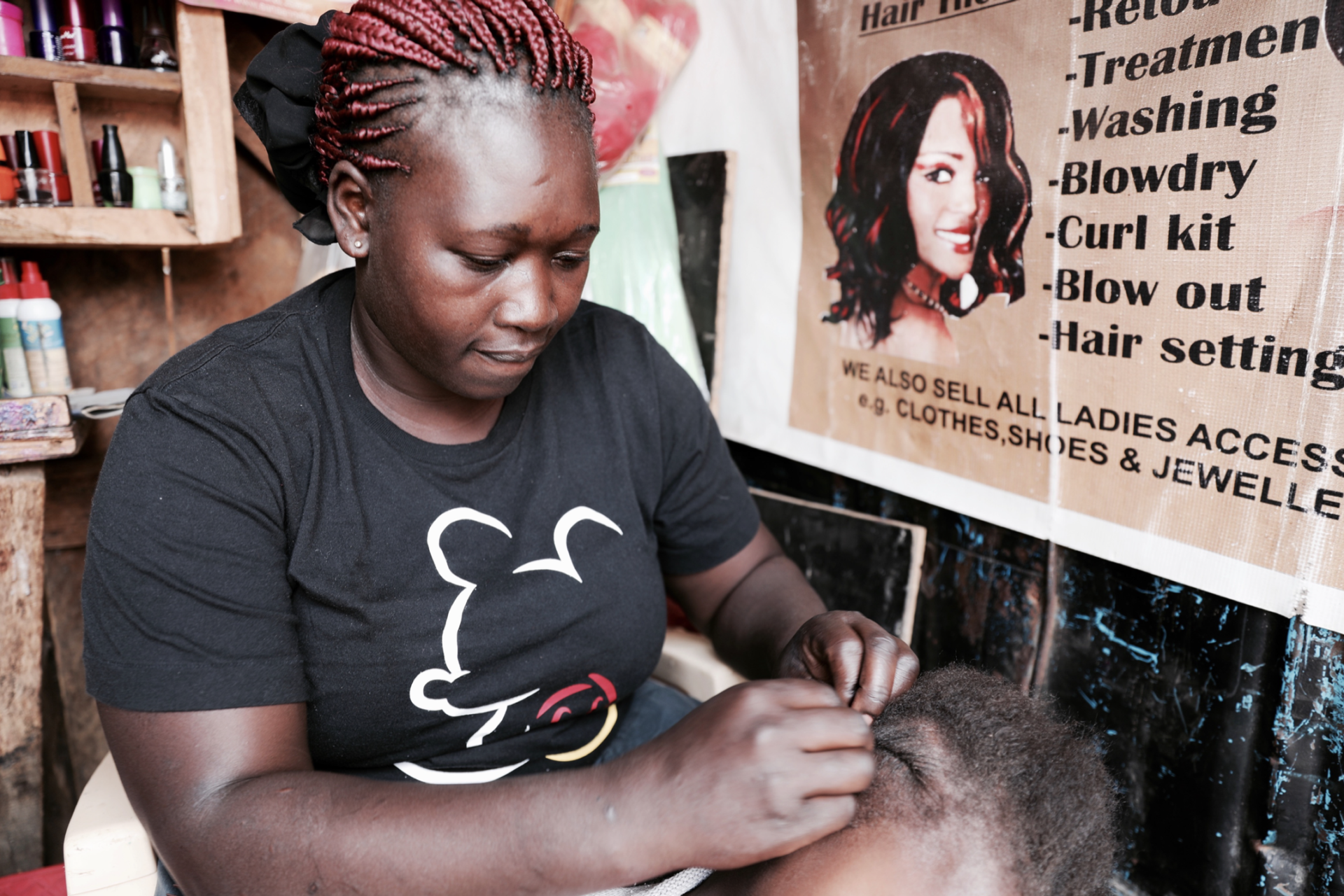
Winfred
Winfred is a former FHOK Kitengela patient. The clinic closed in 2018, and Winfred has been impacted by the closing. Winfred started going to FHOK Kitengela when she became pregnant. She was tested for HIV, and her results came back positive. The staff counseled her on how to handle her pregnancy. “My baby is 1, a girl, Esther,” Winfred proudly states.
When the clinic closed, Winfred didn’t know why. She asked her community health volunteer, Justine, who informed her it was because of a US policy. “It’s very hard. We used to go with friends when we were stressed and they would counsel us and we would leave happy. We had youth group and a support group.” Winfred used to go to FHOK for her ARVs (antiretroviral). Since the clinic closed, she has started going to the subcounty facilities, but services are poor. “Now I have friends who have stopped using ARVs (antiretroviral) because transportation is expensive and the stigma is high.” She goes on to explain that when you switch facilities, you have to start over—retesting, recounting viral load, prescribing drugs—and the stigma around HIV status is high. “When we used to come here [FHOK Kitengela] we were told everything to be clean and happy. Take you drugs, breastfeeding…now at the subcounty, they just give your medicines and you go.”
Winfred has noticed an increase in unsafe abortions among schoolgirls since the clinic closed. She’s also noticed increased cases of fetal dumping. “A fetus of 4 our 5 months’ gestation was thrown in my house in April,” she says.
“On behalf of our friends and clients, please give our clinic back. It used to help us a lot.”
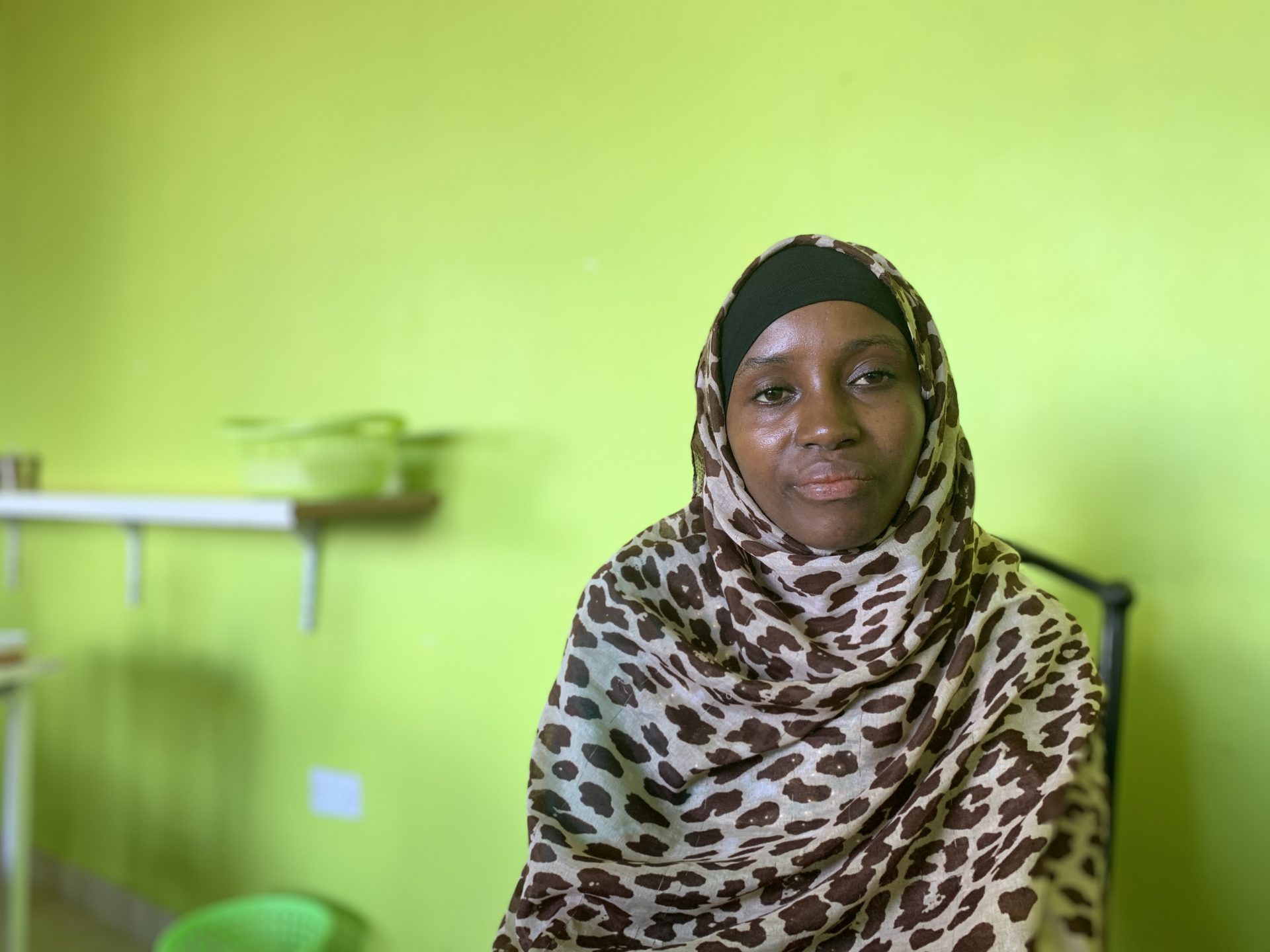
Justine
Justine is a former Community Health Volunteer (CHV) at the FHOK Kitengela clinic. She was paid 500ksh ($5) for each activity, and 100ksh ($1) for each client referral. Since the clinic closed, she has started working with the subcounty facilities. “FHOK treated me well. I was paid and I was getting services for free. Now I am getting 300ksh ($3) per day, but there is no guarantee that I will work every day. It is unreliable. I used to carry condoms for free, do TB screenings and HIV screenings. Now we are in total darkness.”
Justine explained that the clinic closing was unexpected for everyone—employees, CHVs, and especially patients. “Many people who used to go to the facility asked, ‘Where did they go? Are they coming back?’ They (FHOK) provided cervical cancer screenings and created awareness that only through screenings can you be saved. So now they keep asking me, ‘Where do we go?’”
Justine is 39 years old, and a mother to two children. Her eldest is 20 years old. Her other child is only 6 months old. “When I used to go to FHOK to volunteer, I would remember my implant (contraceptive). When they closed I forgot, and my implant expired. I got pregnant. It was a great shock. But FHOK was not there, so there was nothing to do.” This story is not uncommon. Justine tells of another friend who used to get services at the facility who is not pregnant because she could no longer access contraceptive care.
There are many stories of women lacking access to reproductive healthcare, some ending in tragedy. “In early May, we lost a lady because of pregnancy complications,” Justine said. “If FHOK was there, she could have been saved. They understood more about pregnancy than other healthcare workers. I had referred her to the subcounty when she was bleeding. They thought she induced an abortion, so they abandoned her and she bled to death. She was a mother of 4, crying ‘help me!’ When you are seeing a person dying and there’s nothing you can do to help this lady, but you know someone can and you cannot reach them. She’s not the only one, there are many.”
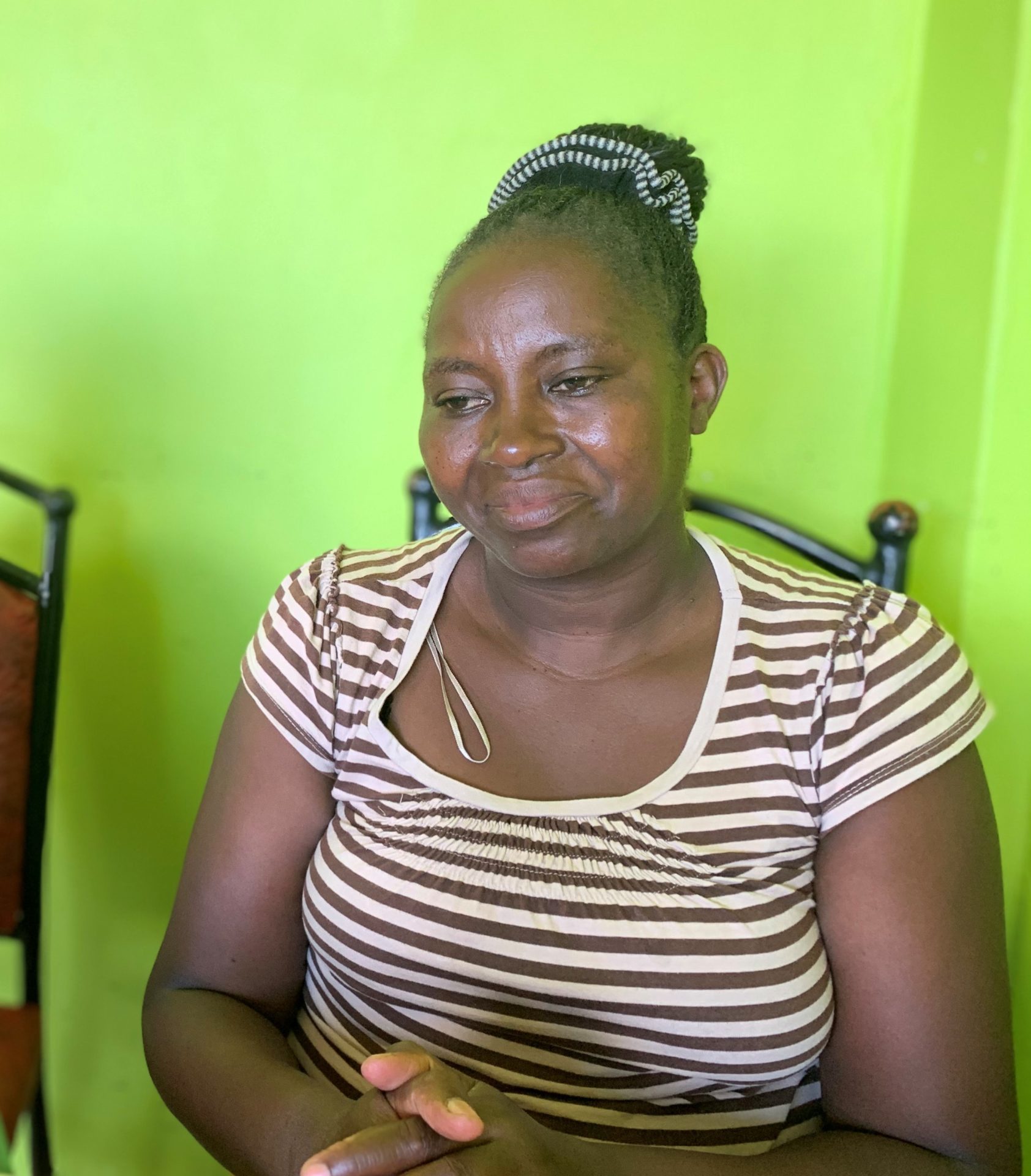
Provider Stories
Dr. John Nyamu
 Dr. John Nyamu is the incredibly busy and well-known founder and chairman of Reproductive Health Network Kenya. In addition, he is a provider and NGO advocate. After working with Marie Stopes International from 1991-1995, Dr. Nyamu opened the Afia Center, which he now owns and overseas. There, he provides reproductive health and obstetric services, including abortion.
Dr. John Nyamu is the incredibly busy and well-known founder and chairman of Reproductive Health Network Kenya. In addition, he is a provider and NGO advocate. After working with Marie Stopes International from 1991-1995, Dr. Nyamu opened the Afia Center, which he now owns and overseas. There, he provides reproductive health and obstetric services, including abortion.
The Afia Center is 1 clinic, with 1 nurse, assistant, receptionist, accountant, and Dr. Nyamu. There are two additional providers who work Monday through Saturday, and he works on Friday and Saturday. At the clinic, Dr. Nyamu has noticed an uptick in unsafe abortion or post-abortion emergency care cases. He attributes this to women not being able to prevent their pregnancies, leading to more unintended pregnancies, more unsafe abortions, and more situations of untrained providers because the government can’t afford to train them.
While Reproductive Health Network and the Afia Center did not receive USAID funding, they were supported by Planned Parenthood Global. Dr. Nyamu was also a consultant with International Planned Parenthood Federation (IPPF) and Family Health Options Kenya (FHOK), where he used to train providers. Now, there is no funding for these activities, and providers are not being trained.
When the United States, under the direction of the Trump-Pence administration, refused funding to the United Nations Population Fund (UNFPA), the effect was felt by many. Dr. Nyamu noted that previously, providers had received contraceptives and manual vacuum aspiration (MVA) kits from the government free of charge through UNFPA. Now, there are no supplies. He reported that USAID is no longer supporting contraception or abortion commodities, further exasperating the situation. “Everyone is affected one way or another,” he says.
If he had the opportunity to speak to U.S. lawmakers directly, Dr. Nyamu would say, “Reconsider removal of support for abortion services. The services are necessary and it’s a right. It will save the mother’s lives.”
Kephine Atieno

Just a few miles from the Indian Ocean, in the coastal Kenyan city of Malindi, Kephine Atieno sits at Venoma Clinic. She established the private clinic eight years ago following an almost-decade-long career with Marie Stopes Kenya. Venoma, much like Kephine, does not try to hide itself from the community; it is situated just off the main road in clear view, with its white walls and blue trim standing out clearly.
With the sounds of tuk-tuks whizzing by the clinic, Melvine Ouyo and I sit down with Kephine to talk about the services she provides. Kephine began providing abortion services when she started working with Marie Stopes Kenya in 2001. “I have a passion for what I do,” she says. “Safe abortion was a key service at Marie Stopes Kenya.” She explained that she could provide 15 or more abortions every day in Mombasa (Kenya’s second largest city, after Nairobi). Today, Kephine still provides abortion services to the patients who walk through her door at Venoma.
“When a girl leaves the facility, she smiles. When she came in, she was unsure, because the stigma is that abortion means you will die.” Kephine has never lost a patient.
While Kephine still works closely with Marie Stopes Kenya for service provision and provider trainings, she does not receive funding from her former employer. “I’m a hustler,” she says when asked how she receives her funding, “and I pay from my own pocket.” While medication abortion costs 4,000ksh ($40 USD) and surgical abortion costs 5,000ksh ($50 USD), no client will be turned away for lack of ability to pay. “I’ve done services for 1,500ksh ($15 USD) for a 16-year-old girl who was at school.” Kephine will take whatever contribution a patient can give.
Venoma has never received USAID funding, but has partners that do and that have signed the Global Gag Rule. Patients Kephine and her colleagues once were able to reach with their contraceptive outreach and youth engagement partnership programs are no longer receiving services. “The gag rule has caused us a lot of pain because we are no longer able to do the activities we used to, and it’s making medical costs go up.”
“First, Trump is very mean and self-centered. He is not for the girl child. The president needs to be told that the girl is the future leader of tomorrow, and we don’t expect all the girls to get married at that tender age, a cause for poverty. We can fight the gag rule.”
Many women in the community seek contraceptive supplies at Venoma, the most common one being Depo-Provera (injection). But in recent years, Kephine and many providers are experiencing stock outs of Depo-Provera, a common theme we’ve seen when speaking with providers in Kenya. “What does [a patient] do when she comes to [get] her next shot but we don’t have it? Other options are more expensive.” She explains that in the last year, she has been given much less stock. “Whatever is left goes to government facilities,” limiting access in private facilities that serve rural communities. Decreased U.S. funding for international family planning, removal of funding to UNFPA, and the Global Gag Rule have exacerbated this stock out.
Kephine says the cost of abortion medication is going up, causing “under-dosing,” where unsafe or unregulated providers are not giving patients enough of the drug. In cases like this, abortions fail and ultimately lead to increased need for post-abortion care. With Mariprist, a combination pack of mifepristone and misoprostol, now on the market, Kephine is hopeful that this practice of under-dosing comes to an end.
“The culture and environment is very hostile,” Kephine explains of her community’s view on her work. “They should understand that sexual and reproductive health is comprehensive, even for the men!” Abortion stigma is exemplified in a story she shares with us about a married mother of three children who was pregnant with another man’s child. An unsafe provider gave her fake abortion pills, which caused her to hemorrhage. When she was found bleeding on the floor of her home, she was brought to the public hospital nearby. The medical providers there refused to treat the patient, and she died at the hospital.
When asked what can be done to break down the stigma and shame so that this incident is not repeated, Kephine’s message is clear: “The pro-choice movement is growing, we just need to speak out loud.
Edwin Owuor
 Geva Family Health Clinic is situated just off a busy road in Kisumu, Kenya. Its primary focus is family planning to all age brackets, including long-acting reversible contraceptives (LARCs), Sayana Press and Depo Provera, contraceptive pills, and natural methods counseling. They do not provide vasectomy or tubal ligation. Additional reproductive health services include cervical and breast cancer screenings, pregnancy crisis counseling (safe abortion care), regular health clinic services such as lab testing, emergency services, and community empowerment.
Geva Family Health Clinic is situated just off a busy road in Kisumu, Kenya. Its primary focus is family planning to all age brackets, including long-acting reversible contraceptives (LARCs), Sayana Press and Depo Provera, contraceptive pills, and natural methods counseling. They do not provide vasectomy or tubal ligation. Additional reproductive health services include cervical and breast cancer screenings, pregnancy crisis counseling (safe abortion care), regular health clinic services such as lab testing, emergency services, and community empowerment.
There are 4 employees at the clinic: 1 service provider, 1 nurse, 1 receptionist, and 1 doctor. They are open seven days a week. In addition to full time staff, Geva has 2 community health volunteers (CHVs), and 2 youth peer providers. Each time a CHV or youth peer provider refers a client, they receive 200ksh ($2).
At Geva, a person can access safe abortion services. The doctor at Geva, Edwin Owuor, is trained by KMET to provide abortion up to 6 months’ gestation. He is trained by Marie Stopes International to 22 weeks’ gestation. In medical school, he was trained on family planning counseling and gender based violence (GBV).
On an average day, Edwin provides 1-2 abortion services at the clinic. “We have to charge and some can’t afford. It can take as little as 500ksh ($5), even free, but the average is 1,000ksh ($10),” he explains. “We were getting commodities for free, so we are charging 300 bob (slang for ksh) for the coil (Paraguard) – it costs 2,000-3,000 for the package, including screening, blood pressure, insertion, and counseling.” With the implementation of the Global Gag Rule (GGR), finances are getting tighter. “We are feeling the heat. We used to get drugs and non-pharmaceuticals at no cost, and now it is challenging.”
Geva Family Health Clinic did not sign the Global Gag Rule and does not receive USAID funding. When asked if he has seen an impact from the policy, Edwin responds, “Something is making the situation worse.” Yet, Edwin has noticed a positive impact from the work he and his colleagues are doing; they have seen a dramatic increase in the number of safe abortions because they are addressing stigma. “We still get unsafe post-abortion care cases, often in the evenings around 7 or 8pm,” he explains.
Edwin went on to describe an instance where a woman in her mid-20s came to the clinic after an unsafe abortion. “The legs were already coming out. I could not provide services because the government would take my license. I told her to go to the public facility, but she went to a traditional birth attendant and died from severe hemorrhaging. I could have helped her.” This story highlights the fears women face when accessing care at public facilities where they may be denied care because of stigma around abortion. They are forced to choose between untrained providers or denial of care.
Edwin also offered a story that highlighted the issues of exceptions to abortion access, such as rape or incest. A 17-year-old girlfriend came to the clinic with her boyfriend. She was in form 2. Her parents had separated, and she was living with her dad. She was pregnant and wanted a safe abortion. Her mother was supporting her decision for safe abortion, but if her father found out she would have to go into hiding, and the clinic will be at risk. It put me in a dilemma because she says she doesn’t want to carry the pregnancy to term,” said Edwin.
When Edwin asked the boyfriend to leave so that he could speak privately with the patient, she informed him that the pregnancy was her father’s. This made things more difficult, because she was under 18 and needed a consent form. Edwin was able to provide the patient with the medical services she needed, and she returned for family planning. “She would have done anything, even taken her own life, to get rid of the pregnancy,” he stated. For a young woman who has been sexually assaulted by a family member, it is understandably difficult for her to be open and honest with her support system to ask for help.
Edwin knows that the impact of the Global Gag Rule runs beyond just decreased access to safe abortion care. “Health systems will collapse,” he says. “Data is not accurate; we only give it [data] to KMET, not the Ministry of Health.” He explains that there is a fear, founded in experience, that the Ministry of Health will come after providers who are providing safe abortion. “Maternal mortality will increase.”
“If there’s another Republican in power for 4 years, we’ll be damned. Consider such vulnerable women, the young ladies. If they can reverse it [the Global Gag Rule], recall it, if they can reverse it.”
Alfred Okulo
 Little Balm Medical Clinic is in the Mumba neighborhood of Kisumu, Kenya. It’s not far off the road, easily visible, and welcoming. Its primary focus is to reach the community with general outpatient services. In 2015, KMET came on board at Little Balm to assist with expanding to include family planning and abortion services.
Little Balm Medical Clinic is in the Mumba neighborhood of Kisumu, Kenya. It’s not far off the road, easily visible, and welcoming. Its primary focus is to reach the community with general outpatient services. In 2015, KMET came on board at Little Balm to assist with expanding to include family planning and abortion services.
Alfred Okulo, the Head of Practice at Little Balm, a private practice, was in medical training for 3 years, plus one year as an intern. “During my internship training, I saw how women and young teens were treated unwell and with a negative attitude. I have four sisters so I can understand. We need to provide services to these women.” He began practicing medicine in 2013, and in 2016 he took over Little Balm. KMET then trained Alfred as an abortion provider. He is able to provide medical and manual vacuum aspiration (MVA) abortion services.
Little Balm has two providers and four community volunteers who assist with sensitizing the community on family planning and safe abortion. The number of patients Alfred has seen seeking abortion care has increased, which he calls an improvement because it means there are less unsafe abortions. “A day does will not pass without providing abortion services,” he states. “After the service, everyone goes home happy.”
“With KMET, we agreed that no client will go unserved,” Alfred explained, “so there is currently no fixed cost for abortion services.” He said typically the cost will range from 3,000-5,000 Ksh ($30-50). Since cost is a challenge for some clients, he is currently paying out of pocket for some clients.
Little Balm does not receive USAID funding, so they were not impacted by the Global Gag Rule. “I’m afraid we will not be able to provide to women who can’t afford it,” Alfred explains. He has seen the impact through colleagues who have lost funding or have been gagged, and he is seeing more informal referrals, where someone is told to go to Little Balm for safe abortion care, but there is no medical record of the referral.
Alfred expressed concern regarding funding of commodities: “What happens when the funding ends? What do we do? The Ministry of Health does not have commodities. I buy them.”
“Depo-Provera is preferred, but it’s not there. It used to be 100ksh ($1), now it’s 150ksh ($1.50), and not many [patients] can afford it. We provide condoms if there is a Depo stock out, but they aren’t used because there is a stigma that having condoms means there is no trust. So we see more unintended pregnancies.” Alfred feels the stock outs are happening because there are NGO funding lapses. He also explains that while he does counsel on the coil (Paraguard), there is a lot of stigma and only a small percentage of patients opt for that LARC (long acting reversible contraceptives).
“We feel how women need these services, and if we don’t provide services maternal mortality will go up. So let the gag rule go so we can provide these SRH (sexual and reproductive health) services.”
